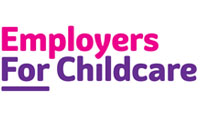Increase in support with childcare costs needed for working parents
The UK has the most expensive childcare costs in the developed world, according to recent data from the OECD. Families in the UK spend an average of 29% of their wages on childcare costs – the highest figure of the 40 countries included in the data. In Northern Ireland, the 2021 Northern Ireland Childcare Survey found that the average cost of a full-time childcare place here equates to 34% of median household income. Importantly, this is just an average, and many families are paying a lot more.
This is not sustainable, and Employers For Childcare continues to campaign for an ambitious Childcare Strategy in Northern Ireland that will see significant investment directly in the childcare sector, supporting its sustainability and quality, helping to improve pay for those working in the sector and, importantly – substantially reducing fees for parents.
At the same time, we are working to ensure that every family is benefitting from the financial support they are already entitled to with their registered childcare costs – from schemes such as Tax-Free Childcare and Universal Credit. Most families are entitled to support ranging from 20% up to 85% of their costs, however support through each scheme is capped – at levels that have failed to increase since their introduction, despite a continued increase in the cost of childcare.
It is not right that Government support with registered childcare costs has remained static when childcare costs are increasing significantly – and both providers and parents are under immense pressure.
Not only does this make childcare increasingly unaffordable for families, it acts a disincentive to parents taking on more hours of work. During his Autumn Statement, Chancellor Jeremy Hunt announced that the Work and Pensions Secretary will be conducting a review into the issues holding back workforce participation. He referred specifically to in-work conditionality for Universal Credit. It is the failure to adequately invest in our childcare infrastructure that is the greatest issue holding back labour market participation and must be addressed to deliver economic growth and stability. The ability to access affordable, high quality and flexible childcare is critical to enable parents – particularly mothers – to move into and progress in work.
Existing financial support should therefore be extended immediately to cover the full amount of a family’s eligible registered childcare costs, otherwise we will see more families unable to afford the childcare they need. This will put further pressure on them, on the childcare sector and on our economy as a whole – at a time when, as a society, we simply cannot afford to do so.
Remove the cap on Tax-Free Childcare and increase the rate of support
The Tax-Free Childcare scheme allows eligible working families to claim 20% of their registered childcare costs from the Government, up to a maximum of £2,000 per child per year, or £500 per quarter. This equates to 20% of childcare costs of £10,000 per year.
What this means is, once childcare costs for a child exceed £10,000 per year – as is more and more frequently the case for the families our team speaks with daily – there is no further support through the Tax-Free Childcare scheme. Any increase in their childcare costs will not be matched by a corresponding increase in support through Tax-Free Childcare.
With childcare costs increasing, this is making it increasingly difficult for families to afford the childcare they need in order to work, and results in some parents – particularly mothers –finding it does not make financial sense to work as many hours as they would otherwise want to.
Example: John and Lorraine
John and Lorraine both work full time. They have one child aged two. Their childcare costs are currently £10,500 per annum and they receive £2,000 in support through Tax-Free Childcare. However, their childcare fees are about to increase to £11,865 per annum – an increase of £1,365. They will not receive any additional support through Tax-Free Childcare, as the cap on support is £2,000 per year. The additional amount alone is equivalent to almost a full month of Lorraine’s salary. As a result, John and Lorraine are planning that Lorraine will decrease her hours of work to reduce their childcare costs.
We also know, from our work with families, that support of 20% on their registered childcare costs is simply nowhere near enough, and means families are still struggling to afford the childcare they need. In the example above, even with existing support through Tax-Free Childcare, John and Lorraine are paying £8,500 per annum in childcare costs for just one child.
In September, then Education Minister in Northern Ireland Michelle McIlveen announced that she had written to the UK Government requesting an increase in the rate of Tax-Free Childcare savings from 20% to 30%.
We welcome this but would also call for it to be accompanied by the removal of the £2,000 per annum cap on support available through Tax-Free Childcare, so that families can benefit from the savings on the full amount of their registered childcare costs. In tandem, these changes could result in significant financial savings for families, make it much more feasible for parents to work the hours they want to, and will have a positive impact on the economy.
Case study: Grace and Ben
Grace and Ben are paying £520 a week in nursery fees for their one-year-old twins from September – over £27,000 per year. They want to give their twins the best start in life, and both want to continue with their careers and pay into their pensions, but they are concerned that they will have no option but for one of them to cut back their hours or take a career break due to the cost of childcare. The family is eligible for support through Tax-Free Childcare, but the most they can claim in support is £4,000 – £2,000 per child. This only reduces their costs to £23,000 per annum. If the cap on Tax-Free Childcare support were removed, they could be entitled to £5,400 in support at a rate of 20%, or £8,100 if the rate were increased to 30%. This would reduce their costs to £18,900 per year.
Remove the cap on financial support for childcare costs through Universal Credit
Through Universal Credit, families can claim back up to 85% of the registered childcare costs. This is a vital form of support for families but, at present, the maximum monthly limits under Universal Credit are:
- £646.35 for one child
- £1,108.04 for two or more children.
These limits were first introduced in April 2005, under the legacy Tax Credits scheme. It is hard to believe that we are now almost 18 years on, and childcare costs have risen significantly in that time, yet these limits have remained unchanged.
This means there are parents who are in receipt of Universal Credit who are not getting support for the full amount of their childcare costs, and this is set to worsen into 2023. This does not make sense, and parents may have no choice but to cut back their hours of work or, in some cases, come out of the workforce altogether.
We are calling for the caps to be removed, allowing for all of a family’s registered childcare costs to be eligible for support. As well as generating significant financial savings for families, this will make it much more feasible for parents to increase their hours of work, and will have a positive impact on the economy.
Further information
If you would like further advice on help with childcare costs or wish to find out more about what financial support you may be entitled to, contact our Family Benefits Advice Service for free, impartial and confidential advice. Call us on 028 9267 8200 or email hello@employersforchildcare.org – we are here to help.





